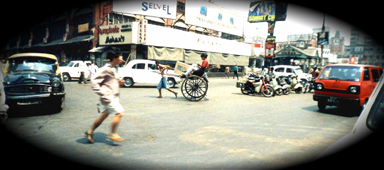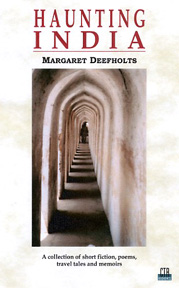CALCUTTA
REVISITED
Calcutta is often portrayed
as a sweltering hell hole - but under the surface, it has much to offer visitors.
The city's historical buildings and monuments are reminders of a rich colonial
past; its citizens enjoy a cultural heritage of music, theatre, dance, literature
and art. For those who once lived in "Cal", much has changed over
the years, but paradoxically much also remains the same.
An excerpt from Haunting India

by
Margaret Deefholts
[The following paragraphs occur half way through the chapter on Calcutta]
"...We
amble through the maze of stalls in Hogg Market-popularly known as the "New
Market" even though it has been in existence since the early 1900's.
Not too much has changed here since I was a teenager, except for a noticeable
lack of Anglo-Indians thronging its passageways. Part of the complex burned
down some years ago and has been replaced by an upscale air-conditioned mall.
We fend off persistent coolies and gawk at the merchandise on display: bolts
of vibrant silks and crisp cottons, ready made garments, Bengali handicrafts,
costume jewellery, cane furniture, crockery, and glassware, all for sale
at
a fraction of the price we'd pay here in Canada.
Not for the squeamish, but fascinating nonetheless, is the produce and meat
market located in a cavernous building adjoining the main market. Bluebottle
flies shimmer around mutton shanks suspended from meat hooks, and entrails
such as livers, kidneys, hearts and brains are set out for inspection on marble
slabs. The smell of ripe pineapples and papaya permeates the aisles of the
fruit section. Noelene and I stop to haggle over a basket of Indian gooseberries.
These are small yellow berries covered in a pouch of dry paper-thin leaves,
and as I pop one into my mouth, the juice spurts, sweet-sour against my tongue,
evoking memories of my mother's gooseberry jam, eaten smothered in fresh cream
at tea-time.
Indeed, what can be more evocative than the smell and taste of food relished
in childhood? I take the time to drop by Nahum Confectioners in the New Market.
The old proprietor has passed on, but his son peers at me and says, "Penn-Anthony?
Of course I remember your parents…they ordered Christmas cakes from us
for years! And didn't we once make a Birthday cake for you in the shape of
a grand piano?" I'm astonished at his memory. Later, as I turn to leave,
he comes up to me and says. "Next week is Easter Sunday, so here is something
for you, just for old times sake." He grins and hands me a paper bag.
Inside it is a small marzipan Easter egg.
Flury's on Park Street still retains its Edwardian ambience: afternoon tea
accompanied by a selection of cakes and cream-rolls, is served on bone-china
crockery. The Anglo-Indian maitre d' is intrigued to discover that Noelene
and I are also Anglo-Indians. In the course of our conversation I casually
mention that I wish I could find another well-remembered Calcutta delight-spiced
sausages. Not only does he offer to make a trip to the Entally meat market
at dawn to buy these on our behalf, but his wife cooks them for us as well,
using a traditional Calcutta Anglo-Indian recipe which calls for them to be
marinated in vinegar and mustard oil. Only in India is the hospitality as
warm as its sunshine!
At the other end of the scale from Flury's elegance, is Nizam's, which has
been in operation for over 70 years. Tucked into a dimly lit alleyway in
the
city's hub, it is a small unpretentious place with ramshackle furniture,
neon tube lighting and no air conditioning. But, as every Calcutta-wallah
knows,
Nizam's kati-kebabs and rotis are fit for a Moghul emperor. They sizzle with
dark, mysterious spices that caress the palate like a teasing, smouldering
flame. The four of us drop into Nizams one night, and despite the lateness
of the hour, there is a steady stream of well-dressed customers driving up
in their cars, or strolling in from a nearby movie theatre after the last
show. Some things haven't changed at all, even after a forty-five year absence..."
![]()
Back to Haunting India Table of Contents

Back to Margaret's "Welcome to My Villa" Page